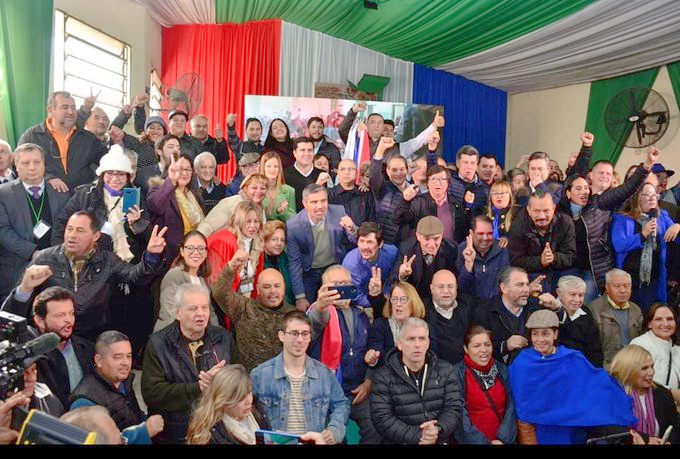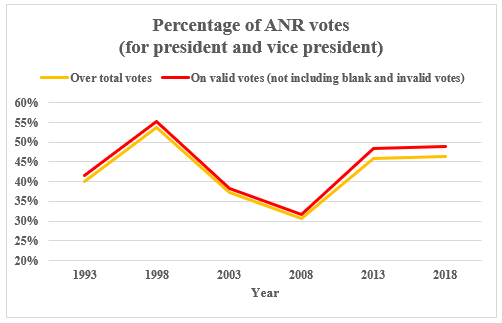The need for practicality in the opposition (I): candidacies for president and governorships

By Javier Lassalle
Most of the political parties in Paraguay are in the process of electoral union through an alliance that would compete against the ANR in the elections of 2023. The invitation to the formation of the coalition includes actors of the entire ideological spectrum and several parties have already expressed their interest in the call.
The broad political spectrum implies that within the concertation there are possibly parties as different as the Frente Guasu and Patria Querida, i.e., people who tenaciously oppose the Zavala-Riera Law and Zavala himself. It is certainly awkward several people may wonder what the point of this is. Why should an opposition front encompassing such different parties even be proposed? The answer, to me, is there is simply no other option. It is the ANR that is forcing this situation.
Let us analyze the percentage of votes that the ANR had from 1993 onwards in the presidential elections. In general, the ANR does not fall below 40%, except in its worst years (2003 and 2008) due to the schism they suffered with UNACE. Note the case of 2008: the ANR is divided for the only time in this period (there was no famous “Republican embrace”) and the candidacy of Lino Oviedo (UNACE) attracted many colorado votes. This is perhaps the worst possible scenario for the ANR, but it still obtained 30.6% of the votes and 31.8% of the valid votes.

Source: TSJE
What can the opposition parties do in this scenario? There is no other option but to unite. Any political grouping that has serious intentions of being a government needs to unite with the rest of the opposition. Also, any political grouping that decides not to participate in a great opposition alliance or agreement, plays in favor of the ANR. It would have been different if the ANR averaged 40% or less (which happened when Lino Oviedo divided the ANR), where there would be a possibility of winning with only a fraction of the opposition to the ANR. But Lino Oviedo is no longer here, and the ANR will arrive united, no matter how many accusations are made in its internal elections.
the union responds to a practical need, and it is necessary to admit it without any twists and turns. Those who unite do not necessarily want to be together, but they need to be together. If they unite, what are the reasons to vote for them? Many of us believe that the advance of organized crime and corruption without consequences are reasons enough. On the various other important issues, the people will choose through their legislators.
In the case of the governorates, the situation is similar:

Source: TSJE
There are departments in which the opposition must not only go united but must also be able to attract votes from the ANR itself to win or appeal to an extraordinary increase in electoral participation, since the ANR’s preference usually exceeds 50%.
How does the ANR achieve such approval over time? I am not a political scientist, so I leave it to others to explain it. But it is remarkable that even with its internal differences, this group manages to unite for the general elections. Opponents, if they want to succeed, should do the same.
The ANR, unlike the opposition, has historical factors, tradition, etc. that help to keep it united. The opposition does not have this. In addition, there is probably more ideological variation in the opposition. This great ideological division, moreover, will make impossible any attempt to present a program or country project that can go into details, since, if it does, it will touch on issues on which not everyone will agree and will cause enough voters to defect from the concertation for the ANR to win.
So, what can the opposition coalition offer differently than the ANR? As argued, a detailed offer will exclude people necessary to win. But I cite some general issues that could be agreed beyond the differences.
First, the problem of organized crime. Here there is much that can be done. Scanners 24 hours a day in all ports, radars, control of certain key actors in money laundering, tobacco traceability, etc. In fact, here the Frente Guasu and Patria Querida usually vote in the same direction. Several events in recent months have placed this issue at the center of the debate. The linkage of some criminals with the ANR or even some ANR authorities proven to be part of organized crime should be capitalized by the opposition.
Second, the fight against corruption. It is not that the colorados in general are considered corrupt, but history shows that in cases such as those of the governors of Central and Guaira, the ANR usually protects its corrupt people. What will the opposition do if one of its governors or another authority has a case similar to Hugo Javier’s? The opposition could offer the citizens a clear protocol of action in these cases, not defending corrupt people just because they belong to their sector.
The third thing that the opposition can offer is that the people decide which model of country to follow. Beyond the presidential formula, the model of the country is chosen in the Chamber of Deputies and Senators and it is there where the people will choose what they want. If people want something from the left, they know very well who to vote for; if they want a more right-wing approach, they also know who to vote for. It is no small thing that the opposition can choose a winning formula and its legislator, since in all previous alliance processes the formula was previously chosen by political agreement.
As for governors, the opposition should be able to elect only one candidate per department. Some small opposition parties are afraid to go to an internal election because, they argue, the PLRA with its structure would easily beat them. It is possible. One option is to reach a political agreement where the PLRA takes the gubernatorial candidacies where it has more chances (Central, Cordillera, Concepción, Amambay and others) and yields to other parties in those departments where the opposition needs to attract colored votes in order to win (since the ANR usually has more than 50% of the votes) such as Paraguarí, Ñeembucú, Misiones, Boquerón, Alto Paraguay and others.
In short, the union responds to a practical need, and it is necessary to admit it without any twists and turns. Those who unite do not necessarily want to be together, but they need to be together. If they unite, what are the reasons to vote for them? Many of us believe that the advance of organized crime and corruption without consequences are reasons enough. On the various other important issues, the people will choose through their legislators.
Cover image: @concertacionpy
